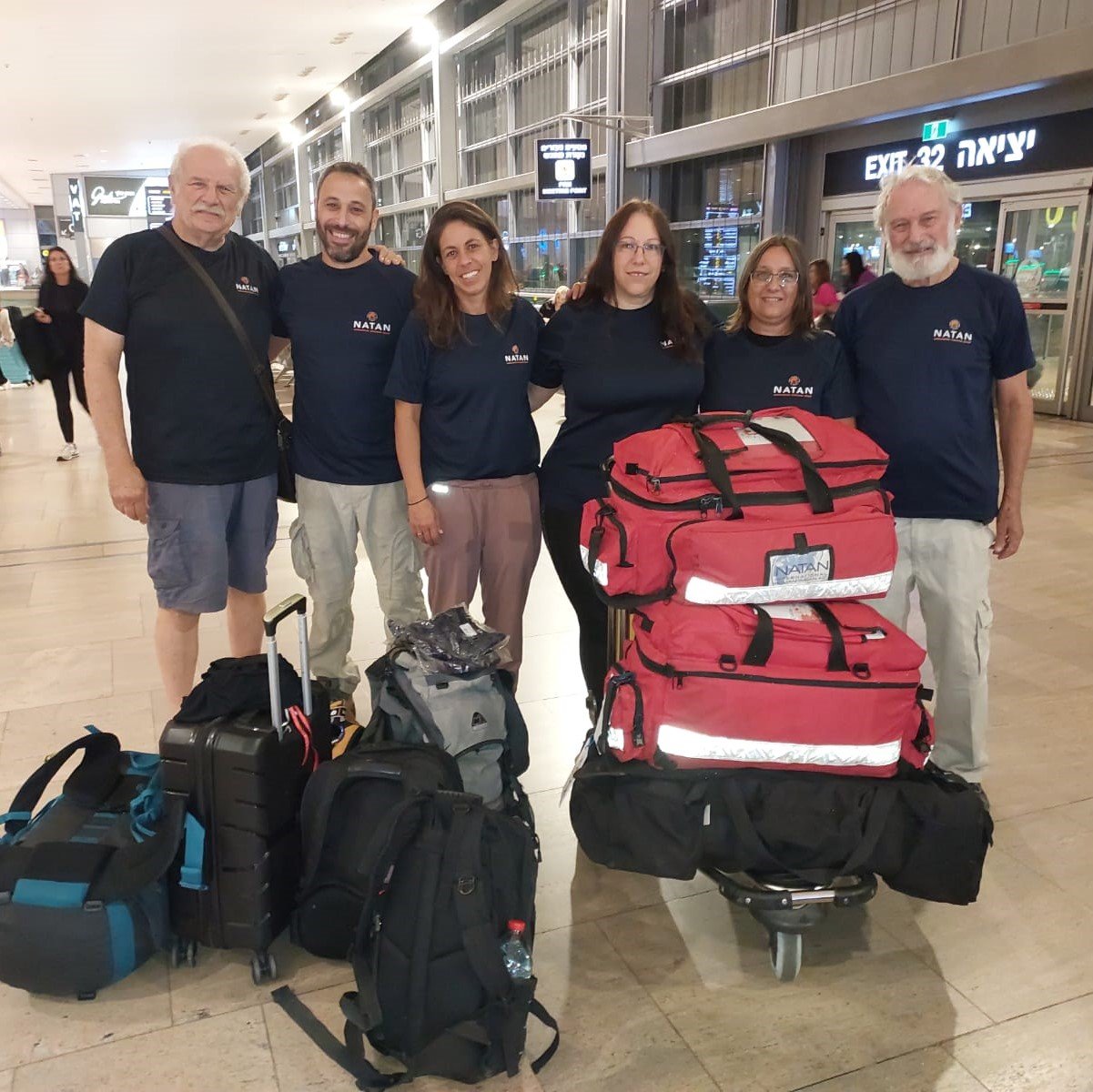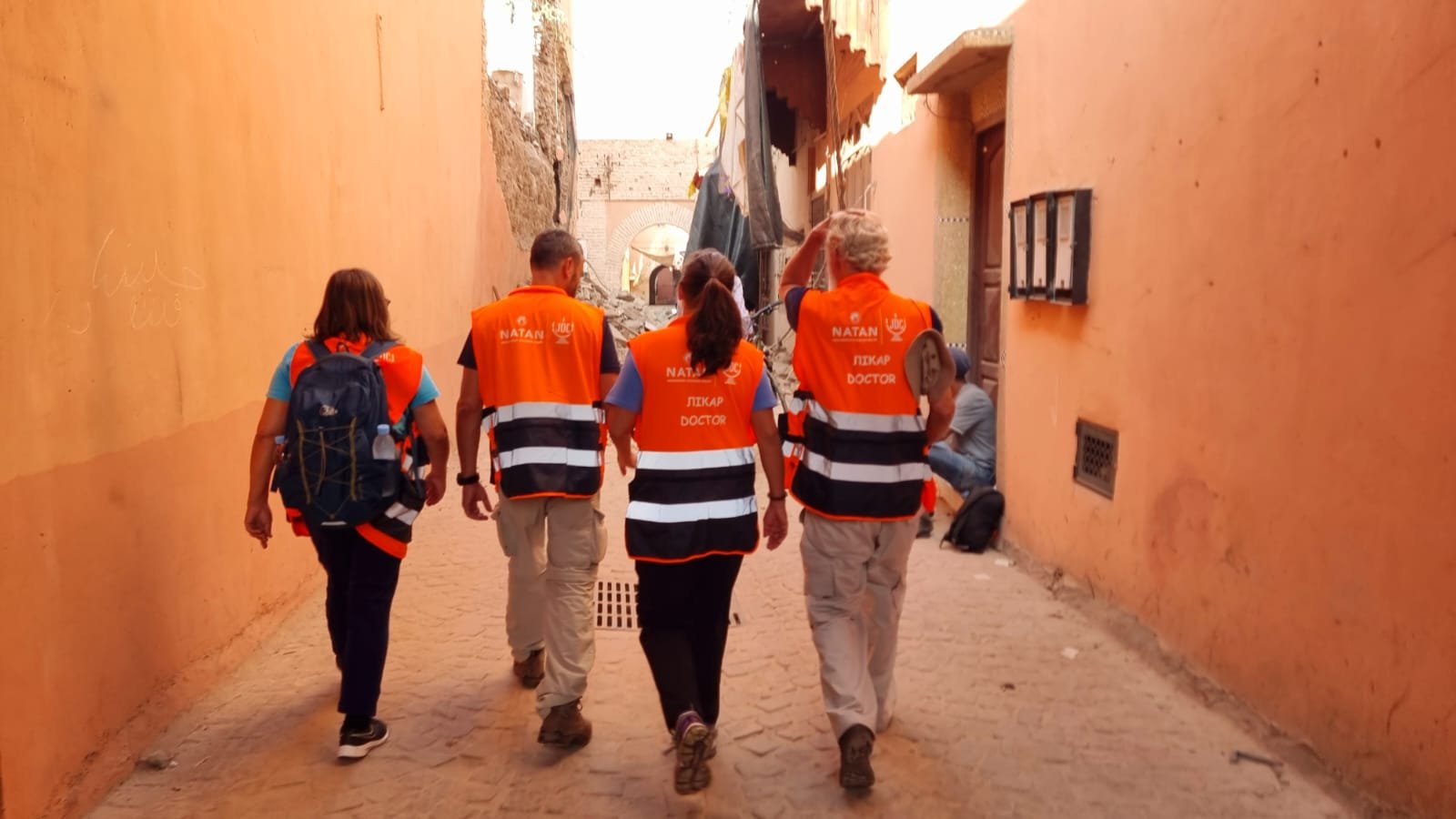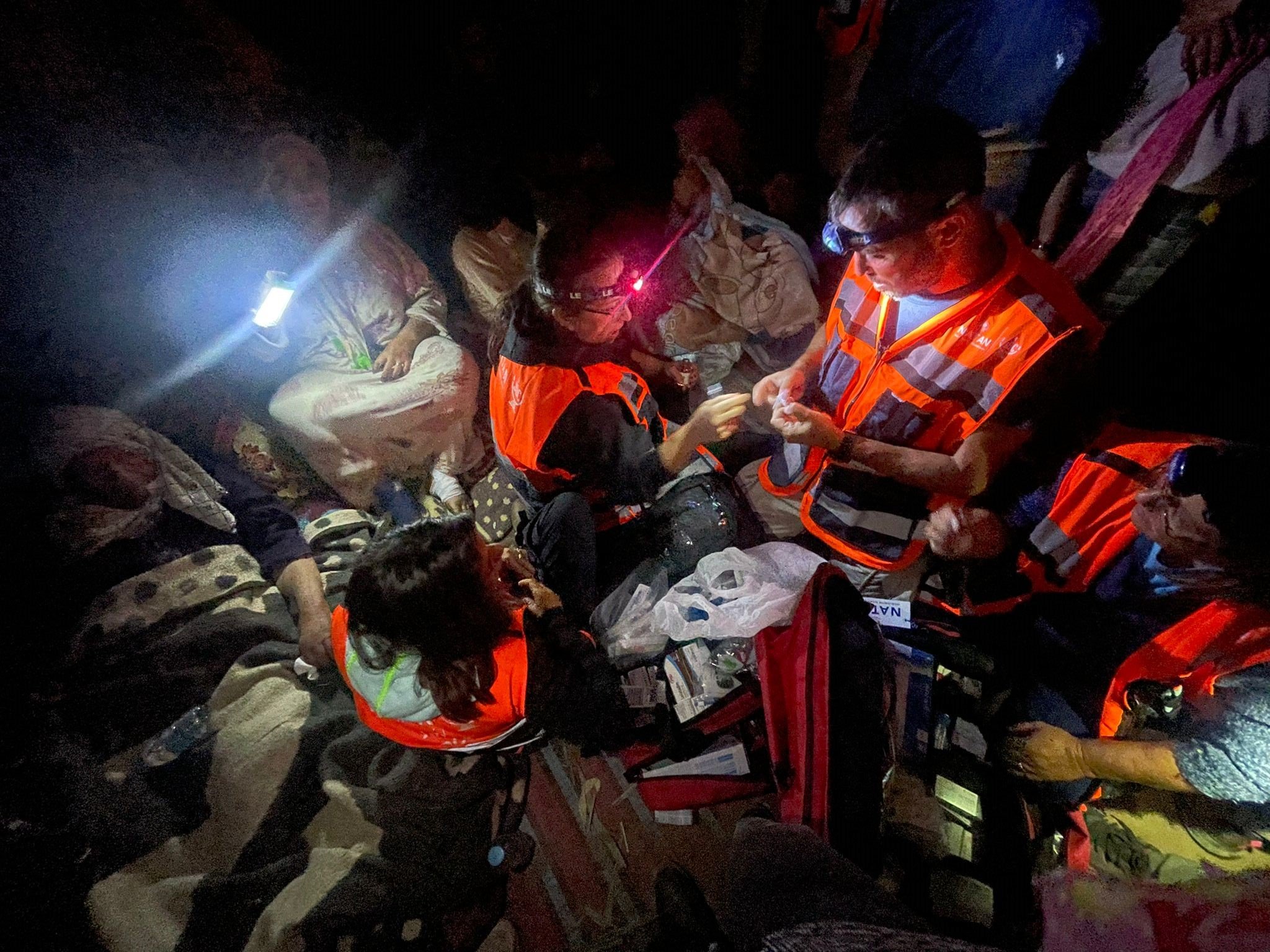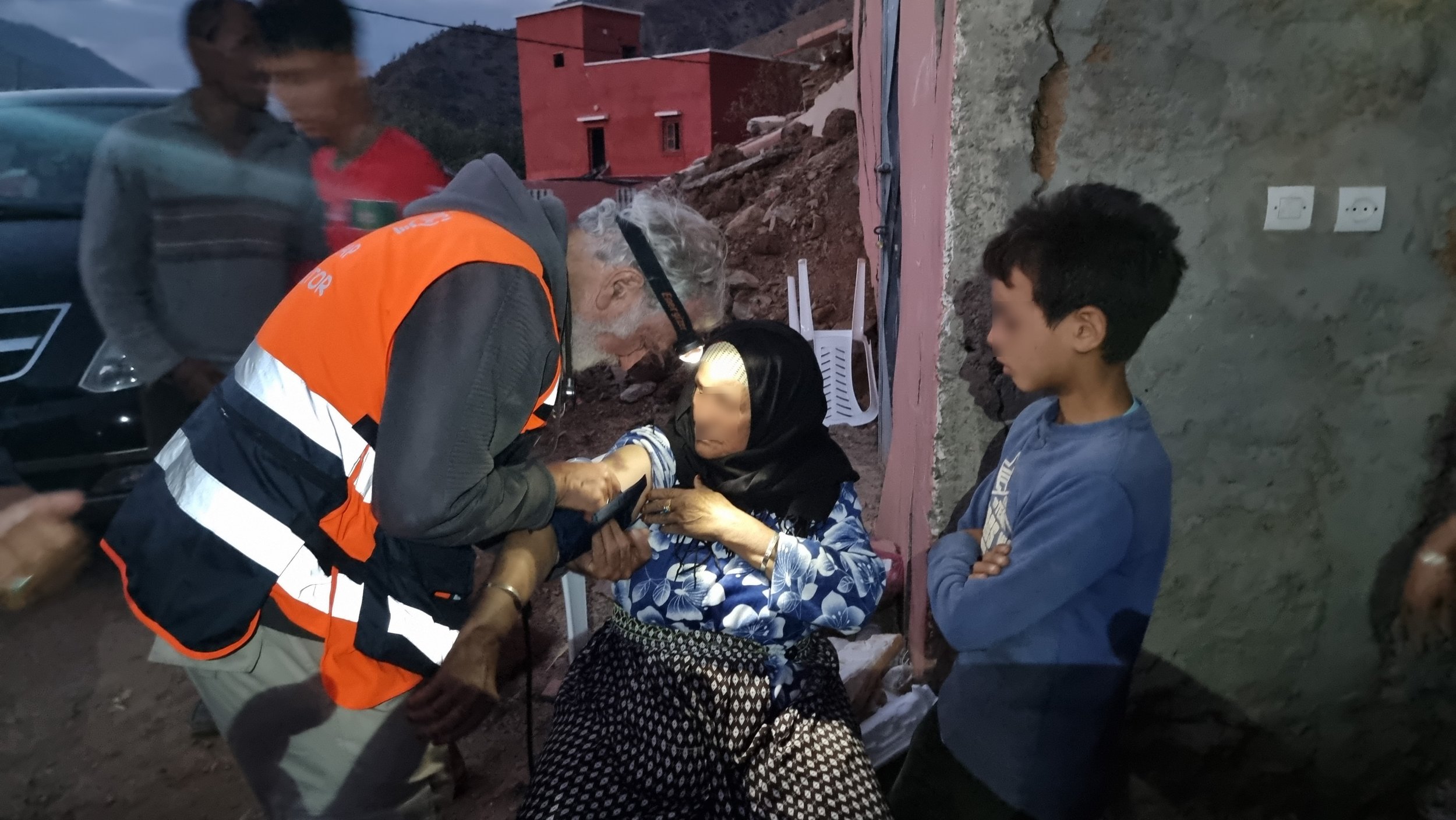Heartbreak and Healing in the High Atlas Mountains
NATAN Worldwide Disaster Relief long-time volunteer, Dr. Michael (Mick) Alkan, led NATAN’s first relief team to Morocco following the massive earthquake which struck the Atlas Mountain region on Sept. 9, 2023. Here is Mick’s first-hand account of his mission.
On a quiet Saturday morning, news broke of a severe earthquake striking the Atlas Mountains in Morocco. I immediately contacted Danny, the Chair of NATAN. By noon, the radio reported that over 1000 people had been killed, with many more missing. Later that afternoon, Danny called me and asked if I had a second passport. He asked me to lead the NATAN medical team in the disaster relief effort and I agreed without hesitation. Our team would travel to Morocco on the invitation of the local Jewish community in Marrakesh.
The departure was scheduled for the next morning. The evening was a whirlwind of canceled plans for the upcoming week, packing a small bag, and locating both my passports along with some leftover Euros from previous trips. A preparatory Zoom briefing with the NATAN team followed. We signed off Zoom with the agreement to meet at the airport at 4:30 am. Sleep eluded me that night as I filled out forms, received calls from friends wanting to join, and battled anxiety and the fear of forgetting crucial items.
Unfortunately, there were no direct flights to Marrakesh, our intended destination. We had to settle for Casablanca, which was 300 kilometers north. My team and I gathered at the airport, where Danny and the NATAN logistics team arrived with four overweight bags containing our medical equipment, medications and supplies. As we waited at the gate, we took the opportunity to get to know each other better.
My friend Einav Levy, with extensive rescue experience, would be my right-hand person. Ma'ayan Bacher specialized in emergency medicine had left her children behind to help. Dania Takagi was an emergency pediatrician, and Violaine Crassac, a nurse and midwife. We all spoke Hebrew and English, with Einav and Violaine also fluent in French. My rusty high-school French would hopefully come in handy. None of us had prior knowledge of the contents of the bags, but we assured security that they contained no gifts for our destination.
Seen above: NATAN Chair Danny Kahn (far left) seeing the team off at TLV airport, Sept. 10, 2023. NATAN Team (left to right): Dr. Einav Levy; Dr. Maayan Marin Bacher, Dr. Dania Takagi, Nurse Violaine Crassac; Dr. Michael (Mick) Alkin – Field Mission Leader
Upon landing, a rented van awaited us at the airport, thanks to the efficient NATAN team. Einav drove us to Marrakesh, while I made phone calls to connect with contacts provided by Danny. Reflecting on our week-long mission, it became evident that local contacts played a pivotal role in our success, safety, well-being, and effectiveness in a foreign country grappling with a disaster.
One of these key contacts was Omar Bouchqraoui, who, with one phone call, dispelled my anxiety. Omar owned guesthouses in Marrakesh and generously welcomed us to one of them. He also assisted us in returning the rented car and connected us with a local driver and vehicle for the mission's duration. The guesthouse, located in the old town near the bustling Jamia-el-Fenah square, provided a safe haven for our mission. Our driver, Idris, spoke English, French, and Moroccan Arabic. He not only drove, skillfully navigating the hazardous roads, but also lent a helping hand, translating for patients, and always wearing a warm smile.
Dr. Michael (Mick) Alkan of NATAN Worldwide Disaster Relief at the site of the massive earthquake in Morocco’s Atlas Mountains, Sept 2023
On the first day in Marrakesh, Omar guided us to the old Jewish quarter, which had reportedly suffered significant damage. However, our visit revealed that only a few buildings were affected, and our medical team was not needed there. Our second contact, Errachid Montassir, was the country manager for USAID who transitioned into leading an NGO formed by his family and friends. They were delivering material aid to remote villages affected by the disaster but lacked a medical team. We gladly accepted his invitation to join them and assist in the High Atlasvillages severely impacted by the earthquake.
Our evening was spent at the guesthouse, where we spread out our equipment and supplies to assess what we had and what we were lacking. The next morning, we purchased fluids and medications and stocked up on provisions for the journey. At the first of several devastated villages we reached, we were greeted by scenes of utter destruction. Not a single house stood, and the village paths were impassable, buried in rubble and debris. Survivors were staying in blue tents, where a few women cooked communal meals in large pots. Donated bedding, bottled water, and food provided for a modest existence.
We set up a field clinic and soon a teenage boy approached us, his arms bandaged and his voice reduced to a whisper. He spoke French and expressed gratitude as I tended to his wounds and assured him that they would heal in a few days. Errachid informed us that the boy had been injured while digging out his parents' bodies from beneath the ruins of their home.. He had buried them in a communal grave, along with 45 other villagers. His traumatic experience had left him unable to speak aloud. We offered comfort and refreshed his dressings. Holding him close, I felt emotionally drained, unable to do more for this young boy.
We continued our journey with Errachid, navigating challenging mountain roads, all but destroyed by the earthquake. Despite the obstacles, Idris, our driver, remained unfazed. After a long night of operating in our improvised field clinics, we headed back to the city. We reached Marrakesh at 3:30 am, after navigating traffic on the badly damaged mountain roads.
The following day, we divided our efforts: I accompanied Einat Levi, an Israeli living in Marrakesh, who had stayed to help. Einat and I took a long drive to a remote area which had not yet received any aid, while the rest of the team joined a makeshift hospital to work alongside the local medical staff. We set out on a challenging journey through deserted roads, ultimately losing phone reception.
Morocco, Sept. 2023 - Dr. Mick Alkan, right, with local partner Errachid Montassir
However, upon reaching our destination, we faced opposition from local authorities, who refused to allow foreign medical teams to enter. Frustrated, we returned to the tent hospital to donate the remaining IV fluids and medications. We contacted NATAN to discuss next steps – which will ultimately be decided by NATAN’s leadership.
As our team’s time in Morocco came to an end, we celebrated the Jewish New Year, cherishing the memories of our mission and the bonds forged along the way. Like us, the next NATAN team to arrive will meet challenges, resilience, and moments of both heartbreak and hope. For our team, it was a remarkable journey of compassion, determination, and the power of collaboration.
NATAN’s next steps: In partnership with the Moroccan NGO, High Atlas Foundation, NATAN is now preparing to launch a trauma care program in the Atlas villages. The program will strengthen the population's capacities to face and overcome the destruction and distress following the devastating earthquake. Building resilience after trauma is the crucial element needed for local communities to recover and rebuild their lives.






